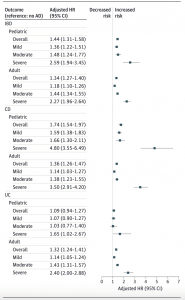A recent study has described an association between atopic dermatitis (AD) and inflammatory bowel disease (IBD), adding a new dimension to our understanding of these complex disorders (Figure 1).

Figure 1: Adjusted Hazard Ratios (HRs) for Inflammatory Bowel Disease (IBD), Crohn Disease (CD), and Ulcerative Colitis (UC) Stratified by Age and Atopic Dermatitis (AD) Severity
IBD comprises can be broken up intonulcerative colitis and Crohn’s disease, both infamous for their chronic gut inflammation. While AD primarily afflicts the skin, it shares a common thread with IBD – a relentless assault by the immune system and the hallmark of severe inflammation.
The research, notably, dispels the fog of ambiguity surrounding the relationship between AD and IBD. They have revealed that adult with AD, commonly known as eczema, face a 34 percent higher risk of developing new-onset IBD, compared to those witthout. The risk increases to 44 percent in children. Strikingly, the severity of AD increases the risk of IBD development. Although the risk is small, this has a big impact from a public health perspective.
These findings offer promise for the development of novel treatments, potentially beneficial for both IBD and AD. Beyond elucidating the shared vulnerabilities, these investigations spotlight the unique characteristics of each disease.
Journal article: Zelma C. C.F., et al., 2023. Risk of Inflammatory Bowel Disease in Patients With Atopic Dermatitis. JAMA Dermatology.
Summary by Stefan Botha










